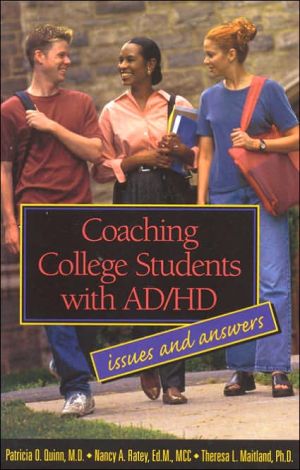

 |

|

The average rating for Coaching College Students with AD/HD: Issues and Answers based on 2 reviews is 4 stars.
Review # 1 was written on 2015-11-18 00:00:00 Angela Keith Angela KeithBoreen, J., Potts, J., Johnson, M. K., & Niday, D. (2009). Mentoring beginning teachers: Guiding, reflecting, coaching. Portland, ME: Stenhouse Publishers. BOOK's STRENGTH: GREAT DISCUSSION OF ELL ISSUES AND MENTORING TEACHERS OF EL LEARNERS Text Purpose The purpose of Mentoring Beginning Teachers: Guiding, Reflecting, Coaching by Boreen, Potts, Johnson and Niday (2009) is to provide experienced teachers with inspiration to mentor people starting a career in the field of education and to provide pragmatic guidance on how to mentor these novice teachers. Those individuals who are not experienced teachers such as student teachers and first-year teachers qualify as novices in the field of education (Boreen, Potts, Johnson, & Niday, 2009). Boreen, Potts, Johnson, and Niday define an experienced teacher as someone with five or more years of teaching experience who is recognized by the learning community as being adept at the profession (Boreen, Potts, Johnson, & Niday, 2009). A mentor is just such an experienced teacher, one who supports and guides novices through the early stages of being introduced to teaching with the goal of preparing the new teacher for the challenges and responsibilities of classroom teaching (Boreen, Potts, Johnson, & Niday, 2009). The text offers windows into the teaching profession and a vision of the positive role that mentors can play to improve the education system (Boreen, Potts, Johnson, & Niday, 2009). Mentors play a positive role by facilitating the development the pragmatic skills of teaching in novice teachers, set an example of professionalism for the whole school community, and re-inspire themselves through the work of mentorship. Many of the pragmatic skills that need to be honed by young teachers such as time and classroom management skills, communication skills, and curriculum development skills are deliberately stressed by the authors as important aspects to lead novice teachers through (Boreen, Potts, Johnson, & Niday, 2009). In addition to the pragmatic set of skills mentioned above, the writers strongly promote modeling reflective practice and personal growth as central to the mentoring and teaching experience (Boreen, Potts, Johnson, & Niday, 2009). The book (2009) seeks to help mentors facilitate new teachers' transitions from college students to education professionals. One often overlooked standard of professionalism in education that the text points out is understanding that student learning needs to be the classroom priority (Boreen, Potts, Johnson, & Niday, 2009). As school leaders, mentors model responsible and ethical leadership and practice when they consistently make student learning the goal of all activities and school resources (Starratt, 2004). Moreover, novice teachers gain more confidence and competence in the classroom through effective guidance and support from mentors than without mentorship; this classroom confidence and competence in turn leads to increased long-term retention of beginning teachers (Boreen, Potts, Johnson, & Niday, 2009). Authors' Background and Credentials: Donna Niday, Ph.D., holds her Doctorate in English education from the University of Iowa, and a Master's degree in English from Middlebury College of Vermont (Iowa State University, 2017). She spent two decades teaching English at middle and high school levels (Stenhouse Publishers, 2017a). Niday's academic interests include the mentorship of new teachers, literature for adolescents, and composition pedagogy (Iowa State University, 2017). In addition to this text, Niday is the co-producer with Boreen of a video series on mentoring novice teachers and the co-author with Niday and Johnson of a text on providing support for new teachers facing challenging situations (Iowa State University, 2017). Niday teaches several different courses at Iowa State University including First-year Composition, Teaching the Reading of Young Adult Literature, Teaching Literature and Literature Curriculum, and Student Teaching (Iowa State University, 2017). |
Review # 2 was written on 2015-05-30 00:00:00 Jennifer Mabbayad Jennifer MabbayadI chose to read this book because I am a mentor for a new teacher this year. I felt that this book would be helpful in addition to the training that I receive from my school district. I found, surprisingly, that this book is *really* good! Most times I might turn my nose up at a book like this however I found it hard to stop reading at times. The most enjoyable part of this book for me was the writing style itself. The writers were wonderful about introducing a topic, such as how to get your administrators to support you, and then they would role play dialogue to help solve the problem. Then a short summary would follow that would wrap up the most important points. The topics covered were very beneficial to a mentor teacher, whether the protege is a student teacher or a brand new teacher with no prior experience. I had a wonderful mentor when I started teaching and I hope to impart part of his wisdom into the mentoring of my new teacher. I feel more confident now that I've read this book and I'll be recommending it to the curriculum director in my school district for all mentor teachers to read! |
CAN'T FIND WHAT YOU'RE LOOKING FOR? CLICK HERE!!!